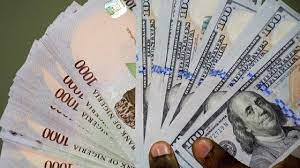Naira plunged on Tuesday as it exchanged for the dollar at the parallel market between 1,005/$ and 1,025/$.
The naira has maintained a downward trend since the Central Bank of Nigeria allowed a free float of the national currency against the dollar and other global currencies in June.
This decline has further led to manufacturers struggling to get raw materials, with more companies planning to sack more workers or shut down.
Related news
- Naira soars, closing N664/$ at I&E window
- Naira Dips to N1000 per dollar
- Fuel subsidy to go, Naira re-design for review – Tinubu
With the declining naira value, manufacturers are faced with cutting production, jobs, and raw material imports.
A chieftain of the Association of Nigerian Licensed Customs Agents, Mr Pius Ujubuonu, said, “The systems have been paralysed already, especially the freight forwarding sector, including the seaports, land borders and airport. Before now, what we used to pay, say N2m, has jumped to N7m, and it is not healthy; it is killing businesses. If this continues like this, I am not sure there would be any import in the coming months and many cargoes would be abandoned.”
Reps plan probe
The House of Representatives on Tuesday directed the Committee on Banking Regulation to probe the use of the dollar and other foreign currencies as legal tender for domestic transactions in Nigeria.
It also called on the CBN to address the impact of the failing Naira against the Dollar and other currencies by implementing monetary policy adjustments to stabilise the currency, address speculative activities in the forex market, and increase the withdrawal limit of the naira to reduce the pressure on dollars and other foreign currencies.
It further urged the Federal Government to formulate policies and structural reforms to reduce corruption and promote economic diversification within the nation’s economy.
The resolution to investigate the use of the dollar and other foreign currencies in Nigeria as legal tender for domestic transactions was a sequel to a motion moved by Ismail Dabo (APC, Bauchi) on Tuesday during plenary.
Moving the motion, the legislator said the naira continues to fall against major currencies since the unification declaration by President Bola Tinubu because of the scarcity of forex.
Dabo said the country’s inability to earn sufficient forex means that the naira could further slide down, causing crippling inflation. He noted that oil theft had further depleted the ability of the country to earn foreign exchange.
“The president’s intention is to allow market forces to determine naira value, but the alarming exchange rate has impacted Nigeria’s economy, causing untold hardship due to increased demand for dollars and a dollar shortage.
“About 90 per cent of Nigeria’s total export earnings are from oil, which is the mainstay of the country’s economy, but changes in the price of oil around the world have a big impact on the country’s foreign exchange market. This explains why the naira has continued to depreciate,” he said.
Mr Dabo added, “A weaker and depreciating naira could increase Nigeria’s external debt servicing costs, potentially reducing government spending on critical sectors like healthcare and education.”
Contributing to the motion, Ademorin Kuye (APC, Lagos), said there was a need for the CBN to tackle the depreciation of the naira while clamping down on the domestic use of dollars.
He stated that most international airlines demand dollars for payment of airfare, while real-estate companies also demand dollars for means of payment.
“Today, if you want to fly foreign airlines, they charge you dollars. In some high-end markets, particularly real estate, they charge you dollars. This is criminal,” Mr Kuye said.
Also speaking in support of the motion, Bamidele Salam (PDP, Osun), noted that the new management team of the CBN had not provided a policy direction since their confirmation by the Senate.
“The management has been confirmed since but we have not heard a policy statement from him, and the market reacts to policy statements,” he said.
The House further urged the Federal Government to promote exportation and reduce importation by enhancing foreign investors’ confidence in its Fiscal and Monetary Policies.
It mandated the Committees on Banking Regulations and National Security and Intelligence to interface with the Central Bank of Nigeria with the purpose of initiating compliance strategies.

